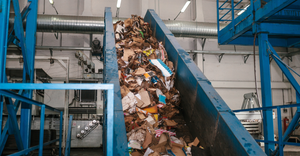Exploring COVID-19’s Economic Impact on Waste and Recycling
Hamzah Mazari, managing director at Jefferies, discusses how the coronavirus pandemic is impacting the market and the public waste industry.
The impact of COVID-19 (the novel coronavirus) is rippling through the U.S. and global economies, but what exactly does it mean for the waste and recycling industry?
To get a better look, Waste360 spoke with Hamzah Mazari, managing director at Jefferies and a 2018 Waste360 40 Under 40 winner, about how the coronavirus pandemic is impacting the market at large and the public waste industry in particular.
Below are excerpts from the discussion.
Waste360: Can you tell us about your observations related to the impact of the coronavirus outbreak on the financial markets?
Hamzah Mazari: Whenever there is uncertainty in the marketplace, the stock market assumes the worst. We’re down 20 percent off of what we saw in the market at its peak. There’s probably more downside until the market gets clarity that the virus is contained. It’s of course had a big impact on travel and leisure—airlines (down 60 percent), cruises (down 70 percent) and car rentals (down 60 percent) are all down significantly. We think it’s a little too early to say if we’ll go into a recession because of this, but we think the market will continue to be volatile until the virus is contained. If you look to how other countries are responding, the spread in China is already slowing, so it may take the U.S. a few months.
Waste360: And what about the outbreak’s effect on waste specifically?
Hamzah Mazari: If you look at the waste space, we think about 80 to 85 percent of the business is unlikely to get impacted because a lot of that business is residential subscription or small commercial container or large container, reoccurring. Waste is the last thing that gets cut when things go bad. We don’t think you’ll see service decreases right away. I think waste is in a defensive space right now.
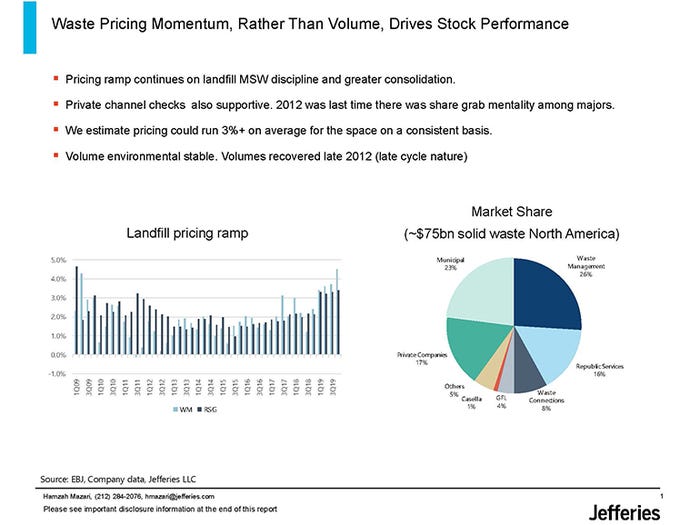
Waste360: Is there a particular area where we might see an impact in the waste industry?
Hamzah Mazari: Where we look to potentially see an impact is on the special waste side, which is more demand or project based. But again, [it has] very minimal impact to the waste space compared to other types of companies out there. We think pricing is uncorrelated with the coronavirus. Any pullback in waste companies is probably a buying opportunity longer term.
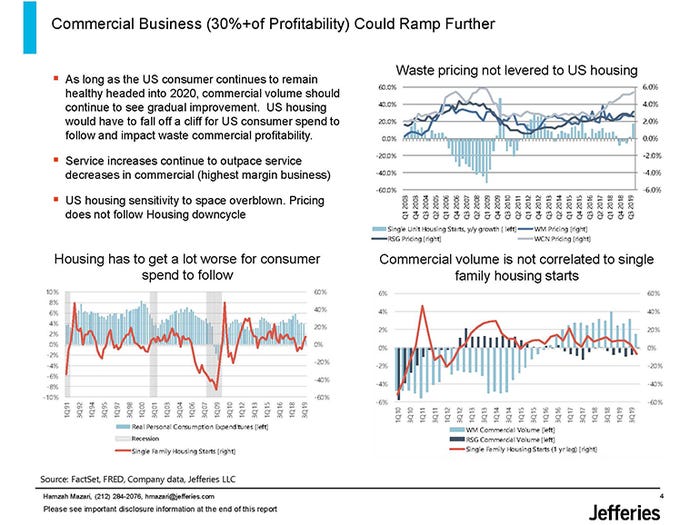
Waste360: Will the current environment in any way change the mergers and acquisitions (M&A) pipeline or pace of deals?
Hamzah Mazari: We don’t think so mainly because a lot of the private companies (which we think make up about $17 billion in revenue today) have been wanting to sell ahead of the November 2020 election because of potential changes in tax law. So, we’ve already been seeing a super cycle, and we think there’s another year of heavy deal flow coming. We think this is very driven by potential election dynamics, and in 2021, maybe you see M&A slow a little—but valuations are still relatively good even with a market pullback.
Waste360: Do you think waste companies have contingency plans to protect personnel right now?
Hamzah Mazari: I think they do. As an example, Waste Management has limited overnight travel for employees. That’s a small example, but I think it trickles down to all the drivers, sorters and staff, and it shows they care about their employees during this tough time.
Waste360: It seems like the air quality has actually improved in China since this outbreak started. Are there environmental benefits to people not traveling as much and factories decreasing their output?
Hamzah Mazari: Yes, as factory pollution goes down and people travel less, there is a benefit to the environment and a reduced carbon footprint. And we hope the focus on the environment in China will continue longer term.
Waste360: What indicators are you going to be watching both short term and long term?
Hamzah Mazari: In the short term, we’ll look at March personal consumption. If those levels haven’t frozen up as much as people think, then the coronavirus impact on the U.S. consumer is maybe being overblown at the moment.
Waste360: What do waste stocks tell investors about the broader U.S. economy and the stock market?
Hamzah Mazari: We think the U.S. waste companies generally are defensive companies, not as cyclical as we saw in 2009. We think they are a good barometer on the pulse of the U.S. customer and the U.S. economy. It’s not as great an indicator of the U.S. industrial cycle, but we look at special waste and construction volumes, which tend to be more of a leading indicator. This sector does lag by one year going into a recession, so it’s defensive in that nature but a good indicator on what consumers are doing.
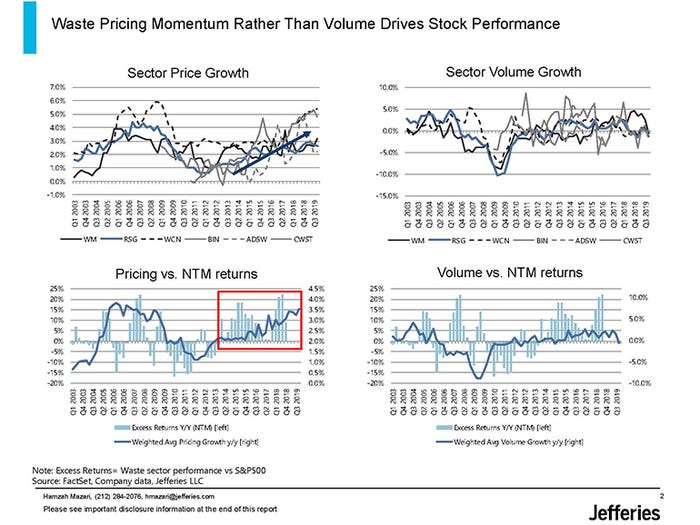
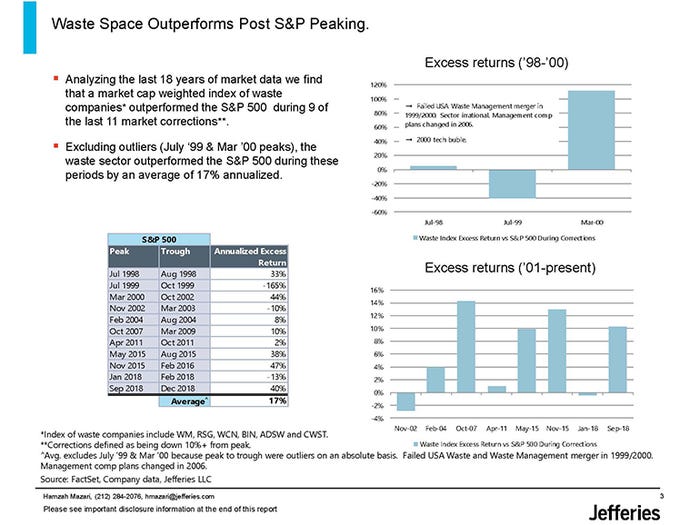
Waste360: Can you talk about the potential you see for further technological advances in the waste industry?
Hamzah Mazari: We think we’re still in the beginnings of technology’s impact on the industry. Could there be a time when you see an autonomous truck doing pickups at midnight when there isn’t much other traffic? Maybe so. We’re in early innings with so much room for further improvement.
Read transcript here.
About the Author
You May Also Like



